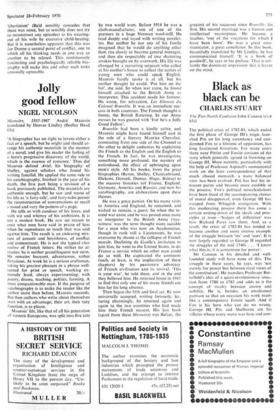Jolly good fellow
NIGEL NICOLSON
Memoirs, 1885-1967 Andre Maurois translated by Denver Lindley (Bodley Head 63s)
'A biographer has no right to invent either a fact or a speech, but he might and should ar- range his authentic materials in the manner of a novel, and give his reader the feeling of a hero's progressive discovery of the world, which is the essence of romance.' Thus did Maurois defend Ariel, his biography of Shelley, against scholars who found his writing fanciful. He applied the same rule to his autobiography, finished in the year of his death, the first part being a revision of a book previously published. The materials are authentic enough, but he saw and wrote of his life as 'a fairy-tale', and fairy-tales permit the reconstruction of conversations to recall a mood and vary the pattern of a page.
He tells us with candour of his loves, and with wit and whimsy of his ambitions. It is not a modest book. He saw no reason to omit what men have said in praise of him when he reproduces so much that was said against him. The result is an endearing mix- ture of conceit and boyishness, of conflict and contentment. He is not the typical cher maitre of French letters. He strikes no at- titudes; he is neither grandiloquent nor stern. He remains buoyant, adventurous, rather flirtatious. At work he is a serious craftsman, taking his greatest pleasure in a phrase well- turned for print or speech, working ex- tremely hard, always experimenting, with poetry, drama, teaching, politics, farming. A most companionable man. If the purpose of autobiography is to make the reader like the author more than before, Maurois succeeds. But then authors who write about themselves start with an advantage; their art, their very function, is to please.
Maurois' life, like that of all his generation of western Europeans, was split into five acts
by two world wars. Before 1914 he was a cloth-manufacturer, son of one of the partners in a huge Norman wool-mill. He read deeply and toyed with writing novelet- tes. But neither he nor any of his family imagined that he would do anything other then rise slowly to become general manager, and then die respectably of two shattering strokes brought on by overwork. His life was changed by a recruiting sergeant who called at his mother's house to collect the names of young men who could speak English. Maurois hardly spoke it at all, but his mother thought he could. Tut him on the list', she said. So when war came, he found himself attached to the British Army as interpreter. This accident made his fortune. He wrote, for relaxation, Les Silences du Colonel Bramble. It was an immediate suc- cess in both countries. The French thought it funny, the British flattering. In our Army messes he was greeted with 'For he's a Jolly Good Fellow'.
Bramble had been a kindly satire, and Maurois might have found himself cast in the role of a literary Maurice Chevalier, commuting from one side of the Channel to the other to delight audiences by explaining the French to the English and the English to the French. In fact, he was investigating something more profound, the mystery of nationhood, the effect of upbringing upon men's style. All his books, from the great biographies (Byron, Shelley, Chateaubriand, Dickens, Disraeli, Dumas, Hugo, Balzac) to the massive histories (of France, England, Germany, America and Russia), and now his autobiography, are elaborations upon these themes.
He was a great patriot. On his many visits to America and England, he remained, and wished to remain, a guest. So when the se- cond war came and he was posted once more as interpreter to the British Army ('eye- witness' was the term thought more suitable for a man who was now an Academician, though in rank still a Lieutenant), he was overcome by shame at the collapse of French morale. Declining de Gaulle's invitation to join him, he went to the United States, to do France a service which no other man could do so well. He captivated the continent (such, at least, is the implication of these chapters) by his passionate advocacy of French civilisation and its revival. 'This is your war', he told them, and in the end they believed him. He returned home in 1945 to find that only one of his many friends cut him for his long absence.
Then began the fifth and final act. By now universally accepted, writing furiously, lec- turing charmingly, he returned again and again to the two countries who had made him their French mascot. His last book (apart from these Memoirs) was Balzac, the greatest of his successes since Bramble. his first. His second marriage was a human and intellectual masterpiece. He became a teacher, `one of the vocations for which I have been born'. He was a great com- municator, a great conciliator. In this book, beautifully translated by Mr Lindley, he has communicated himself. 'It is a book of goodwill', he says in his preface. That is cer- tainly the dominant impression that it leaves on the mind.


































 Previous page
Previous page